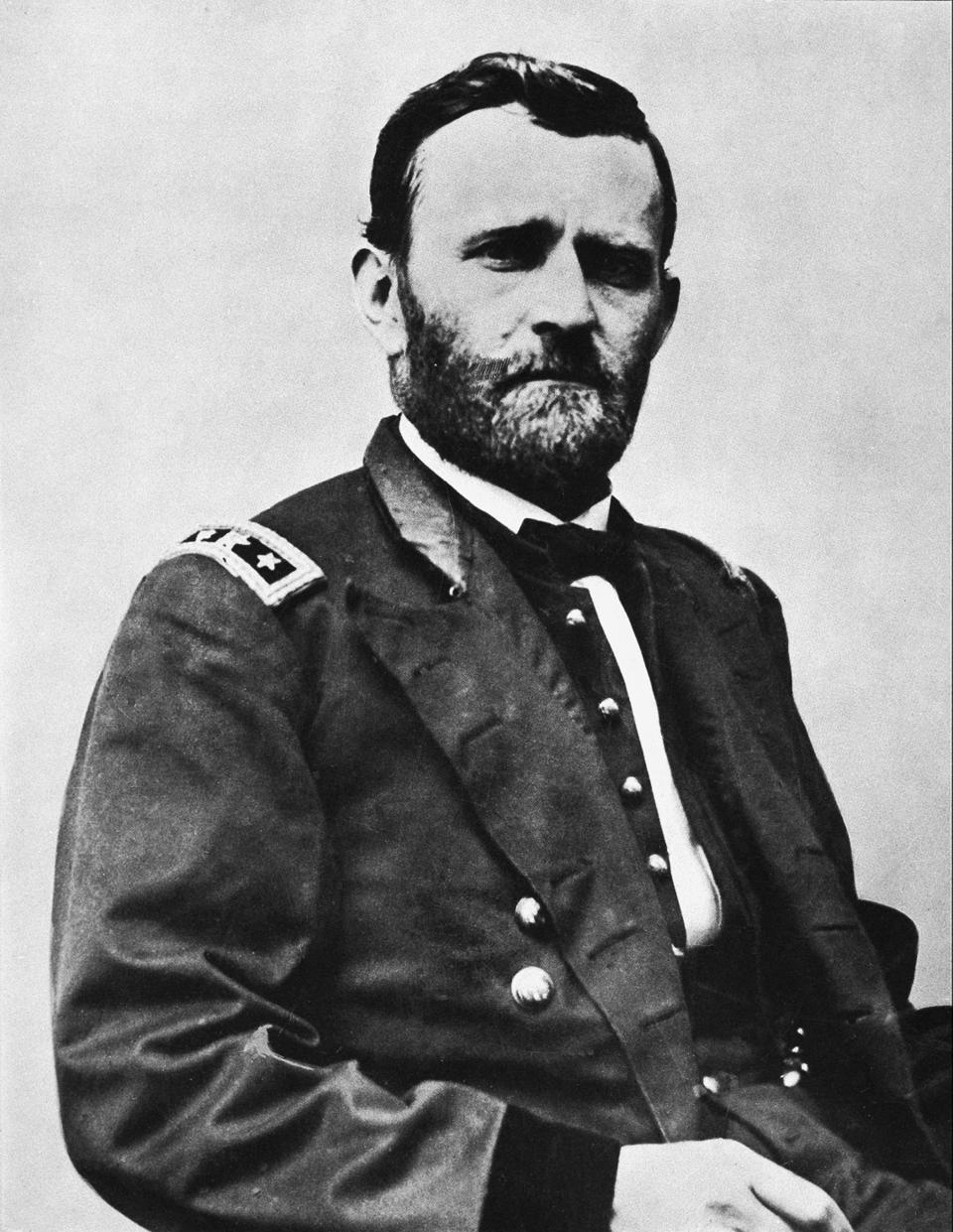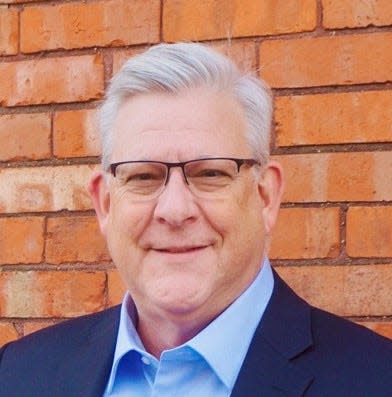Opinion: When President Grant touted public education in Des Moines in 1875
- Oops!Something went wrong.Please try again later.
- Oops!Something went wrong.Please try again later.
In the fall of 1875, the area in Des Moines — then a city of only about 17,000 residents — in and around Fourth Street, Court Avenue and Locust Street included its most prestigious public buildings, including the first Hotel Savery, Moore’s Opera House, the Allen Block and the Aborn House, just newly built. The Younker Brothers had started up their dry goods store the year before. The Iowa Capitol was not yet built.
Today, all the stately places along Fourth are lost to time, but what happened there at the Opera House on Sept. 29, 1875, is still remembered because Republican President Ulysses S Grant gave his greatest speech about the importance of “free” public education and the dangers of giving public money to religious schools.
Like today, the Iowa Legislature and the governor were solidly Republican. Grant arrived by train in the early morning at the Des Moines Valley Railroad. He was to join the 10th reunion of the Society of the Army of Tennessee, a group of Union soldiers he led into battle at Vicksburg and Shiloh, after which Gen. William Tecumseh Sherman led them to Atlanta on the March to the Sea. He knew he would be asked to say a few words to the 200 Civil War veterans gathered.
Iowa 'a good and fitting place' to talk about public schools
James S. Clarkson, the local newspaper editor and postmaster, gave a firsthand account of Grant’s preparations for his speech. At about 5 o’clock in the afternoon Grant ducked into the postmaster’s office after a carriage tour of Des Moines “to get a little rest, and to smoke.” After lighting a cigar and making small talk, Grant admitted to Clarkson: “I have never had … any difficulty in writing out my ideas or thoughts easily and quickly. But when I get up on my feet to speak, everything I know seems to go down into my boots.” But Grant had prepared a speech in advance. “This time I am going to fool them,” he told Clarkson. He showed him six or seven pages of a speech he had been inspired to write on the “public school question” by seeing the public schools scattered around the city on his tour. He said, “Iowa was a good and fitting place in which to given utterances out to the public” on the subject. Clarkson would later write: “This little speech, which, like Lincoln’s short speech at Gettysburg, contained so much living wisdom and enduring merit, has its own little history.” Clarkson recalled that Grant folded up the pages of the speech and put them in his pocket. Grant said, “Now that is ready for the boys tonight and the people tomorrow.”
Later that evening at the Opera House, according to Clarkson, Grant took the stage “arm in arm” with Sherman. Clarkson reported: “He was as shy and embarrassed as a schoolboy; but as his comrades and the great audience cheered him tumultuously, he started to unfold the manuscript to read it. His hands trembled, and he dropped the scattered sheets on the stage.” This is what he said that evening on the subject of importance of public education and the threat of giving public money to private schools:
'The free school is the promoter of that intelligence which is to preserve us'
"I do not bring into this assemblage politics, certainly not partisan politics; but it is a fair subject for the deliberation of soldiers to consider what may be necessary to secure the prize for which they battled. In a republic like ours, where the citizen is the sovereign and the official the servant, where no power is exercised except by the will of the people, it is important that the sovereign — the people — should possess intelligence. The free school is the promoter of that intelligence which is to preserve us as one Nation. If we are to have another contest in the near future of our national existence, I predict that the dividing line will not be Mason and Dixon’s, but between patriotism and intelligence on the one side, and superstition, ambition and ignorance on the other. …
"Let us all labor to add all needful guarantees for the more perfect security of free thought, free speech, a free press, pure morals, unfettered religious sentiment, and of equal rights and privileges to all men, irrespective of nationality, color or religion. Encourage free schools, and resolve that not one dollar of money shall be appropriated to the support of any sectarian school. Resolve that neither the state nor nation, or both combined, shall support institutions of learning other than those sufficient to afford every child growing up in the land the opportunity of a good common school education, unmixed with sectarian, Pagan, or Atheistical tenets. Leave the matter of religion to the family altar, the church, and the private school, supported entirely by private contributions. Keep the church and the state forever separate. With these safeguards, I believe the battles which created the Army of the Tennessee will not have been fought in vain."
Grant’s insistence on a free public education and a prohibition against giving public tax money to private schools only continued to grow after the Des Moines speech in 1875. In his State of the Union address a few months later, Grant repeated his concern and called for a constitutional amendment to enshrine it:

"As the primary step, therefore, to our advancement in all that has marked our progress in the past century, I suggest for your earnest consideration, and most earnestly recommend it, that a constitutional amendment be submitted to the legislatures of the several States for ratification, making it the duty of each of the several States to establish and forever maintain free public schools adequate to the education of all the children in the rudimentary branches within their respective limits, irrespective of sex, color, birthplace, or religions; forbidding the teaching in said schools of religious, atheistic, or pagan tenets; and prohibiting the granting of any school funds or school taxes, or any part thereof, either by legislative, municipal, or other authority, for the benefit or in aid, directly or indirectly, of any religious sect or denomination, or in aid or for the benefit of any other object of any nature or kind whatever."
Republican President Ulysses S Grant was inspired almost 150 years ago while in Iowa to advocate for free public education as a civic bulwark against “ambition and ignorance”, and in the same breath, to warn against using public tax money for private schools of any kind. Grant, Sherman and all the Civil War veterans who gathered in Des Moines then had fought and witnessed their brothers and neighbors die to defeat a social order that believed it had every right to enjoy public benefits and powers, but do whatever it wanted with those benefits and powers, no matter how inconsistent with American ideals.
Grant and every Union soldier said “no” to such an order. Iowans must too. Let us all follow that brave and determined leader who won the Civil War. We must defeat any plan to give our hard-earned public dollars to any private interests.

Tom Walton is director of legal services and general counsel for Delta Dental of Iowa, formerly a trial attorney with Nyemaster Goode. He was a Democratic candidate for Iowa House District 28 in 2022.
This article originally appeared on Des Moines Register: Opinion: President Grant touted public education in Des Moines in 1875
